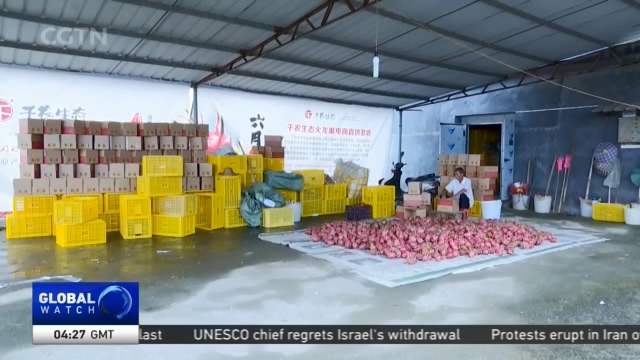
12:58, 30-Dec-2017
China's Income Gap: Targeted poverty alleviation in rural areas

The Pearl River Delta is one of China's richest regions. But millions of people living just outside the delta still live in poverty. China's government is investing heavily in new projects that can help rural Chinese narrow that income gap. Our reporter Ge Yunfei has the story.
Beikeng village is just two hours away from Guangzhou -- China's third largest city. 43-year-old Chen Wenzhong has been living in this village his whole life. He once had plans to move to the city but he stayed home to take care of his two sick sons. His first son has cerebral palsy and can't stand on his own. His second son is half blind. But still works hard to be one of the top students in his class. Almost two years ago, Chen and his wife had another child, a healthy girl. Local wages are low. But Chen says he has no choice but to carry on.
CHEN WENZHONG FARMER "My wife and I make ten to twenty thousand yuan per year. It's far from enough. We spent every penny on medical fees and the children's education. The house was inherited from my father but we don't have any money to keep up with repairs."
A new government project has given Chen new hope in life. He has become a rural entrepreneur. Last year, the local government started a number of poverty alleviation projects. Chen jumped on the opportunity to take out a ten-thousand-yuan subsidy and start his own dragon fruit business.
CHEN WENZHONG FARMER "The first batch of dragon fruit will be ready for harvest by the end of this year. I hope it can increase our income by twenty to thirty thousand yuan."
Now Chen and his wife spend most of their time out on the fields.
GE YUNFEI GUANGZHOU "Growing dragon fruit is one thing, but selling them is another. Rural e-commerce platforms help small farmers like Chen get a fair return on their labor."
A local e-commerce company has pre-ordered all of Chen's dragon fruit. After harvest, consumers across China can use the popular instant messaging service, WeChat, or other national e-commerce platforms to buy Chen's fruit.
ZHOU ZHIHUA QIANNONG ECOLOGICAL AGRICULTURE "E-commerce gives farmers access to markets across China. Thanks to the preorder-grow-sell model, our purchase price is 10%-15% higher than the normal purchase price."
There are dozens of other families like the Chen Wenzhongs in Beikeng village. Instead of just giving them subsidies, the government has encouraged some of them to combine their lands to create a mushroom cultivation company.
ZHU MING, POVERTY RELIEF DIR. QINGXIN DIST., QINGYUAN CITY, GUANGDONG PROVINCE "Now these people can earn two incomes. They earn yearly dividends from their stakes in the company, and earn salaries as mushroom growers. All together they can earn at least 5,000 yuan per month."
Now the average income of Beikeng village is over 11 thousand yuan per year. That's above the poverty line. But compared to Guangzhou's average wage of 47 thousand yuan per year, it is still not a lot.
GE YUNFEI GUANGZHOU "Guangdong Province is home to one of China's richest regions, the Pearl River Delta, and home to some of the country's poorest. Just as the old saying goes: it is better to teach a man how to fish than just to give him a fish. China's targeted poverty alleviation programs are doing just that -- helping to narrow the income gap between the nation's poor and rich. Ge Yunfei, Beikeng Village, Guangdong Province."

SITEMAP
Copyright © 2018 CGTN. Beijing ICP prepared NO.16065310-3
Copyright © 2018 CGTN. Beijing ICP prepared NO.16065310-3